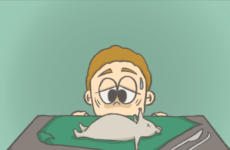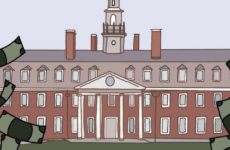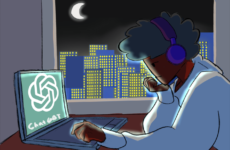I am too anxious to eat in class. I’ve held on to a piece of trash for a whole meeting because I was too nervous to get up and throw it out. When I walk through the Dining Hall, my bones feel weak, my heart pounds in my chest, and butterflies flutter in my stomach. I can’t hold a conversation without overanalyzing the situation–I constantly speculate on whether or not the person wants to be there, talking to me. When I see someone I might have to say hi to on a path, I take a longer, sidestepping route, even if I will be late to class, to avoid any uncomfortable interaction. I am always too afraid to ask for help at a store. If I’ve already placed my order at a restaurant, I can never go back to ask for anything more, regardless if I change my mind. I worry over the most miniscule things. I am overly conscious of myself. Every time someone disregards what I have to say, I feel like a hole has been ripped through my chest. I have said sorry more times in the past week than I can count.
When I consider all these traits, I can never decide if I’m merely shy or if I’m stuck with deep-seated anxieties. I do know that I wish I could find more help in my search for answers. The world, it seems, is always letting me down.
A mental illness is a real illness. It is not a fad, it is not a punch line, and it is not something to be ignored. But I feel that the Choate community and the wider world can regard mental illness as a mere phase that teenagers endure.
One problem with dealing with mental illnesses is that they are often hard to detect. We can be ignorant to these disorders. Let’s say a student breaks her leg. We see the cast, and we sympathize. She discusses the problem with her coaches and they, of course, give her time to heal.
On the other hand, when someone with depression feels so overcome with stress that she needs a reprieve, the symptoms and pain inflicted are not always as readily obvious. This can lead society to brush off her concerns. A student may appear as happy as ever, but, internally, that student may be breaking under the pressure.
In my experience, Choate does not acknowledge mental illnesses as much as it should. In health class, I was taught to learn the signs of a concussion after taking the IMPACT test, but no one told me how to watch for anxiety. Teachers explained what an eating disorder is, but I never heard them emphasize ways to seek relief.
When a girl starves herself then binges then purges, trying to reach some impossibly ideal body, too many of us fail to inquire about a disorder: we have all been taught that this “model look” is normal.
Frequently, when we see students slump into periods of depression, few of us consider that they might actually have a mental illness. We overlook the possibility that chemicals in our brains might be causing these long periods of despair. “Just get passed that exam,” we might say. “Ups and downs are a part of the crazy, stressed-out life here.”
We at Choate can sometimes fall into the habit of using names of disorders as adjectives, undermining the severity of the illnesses. “You look so anorexic today,” someone will tell a girl with a flat stomach. Anorexia, a serious mental condition that affects millions of Americans each year, can cause fatal health problems. Moreover, a person suffering from anorexia doesn’t have to be extremely thin to have the disorder.
Choate students have a tendency to exaggerate their woes. “I’ve been feeling depressed all week,” a student might say after one bad moment. He ignores the fact that someone at his lunch table might actually be depressed. This depressed person now feels unable to come out about this illness—it no longer seems valid. “Other people have it worse off,” our depressed friend says to himself.
Mental illnesses are diseases, not weaknesses. They are no one’s fault, but it is our fault as a society and as a school community that people suffering from these disorders feel like they have to suffer alone. Mental illnesses are treatable, but if we remain ignorant about them, we postpone the solution.
People at Choate should never feel uncomfortable asking to speak with someone about issues they’re facing, whether that be a friend, teacher, stranger, or counselor at the Health Center. We can’t simply tell people to snap out of it. People don’t deserve to suffer in silence.
To everyone out there suffering with a mental illnesses, whether publicly or privately—remember, you can fight it, and you can beat it.





